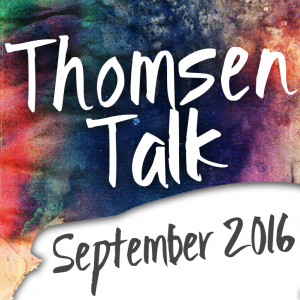Thomsen Talk: September 2016
 Several years ago I directed a play based on the book The Giver. The setting is a community in the future that entrusts all of the memories of the past to one individual. The community has no sense of joy, pain, color or love. A young boy named Jonas is assigned as the next Receiver of Memory, and for training, the current Receiver of Memory must share the memories of the entire world with Jonas, which includes the memory of love. It’s a feeling that is new to Jonas. Upon the discovery of this new idea, he decides one night to ask his parents:
Several years ago I directed a play based on the book The Giver. The setting is a community in the future that entrusts all of the memories of the past to one individual. The community has no sense of joy, pain, color or love. A young boy named Jonas is assigned as the next Receiver of Memory, and for training, the current Receiver of Memory must share the memories of the entire world with Jonas, which includes the memory of love. It’s a feeling that is new to Jonas. Upon the discovery of this new idea, he decides one night to ask his parents:
“Do you love me?”
There was an awkward silence for a moment. Then Father gave a little chuckle. “Jonas. You, of all people. Precision of language, please!:
“What do you mean?” Jonas asked. Amusement was not at all what he had anticipated.
“Your father means that you used a very generalized word, so meaningless that it’s become almost obsolete,” his mother explained carefully.
Jonas stared at them. Meaningless? He had never before felt anything as meaningful as the memory.
“And of course our community can’t function smoothly if people don’t use precise language. You could ask, ‘Do you enjoy me?’ The answer is ‘Yes,'” his mother said.
“Or,” his father suggested, “‘Do you take pride in my accomplishments?’ And the answer is wholeheartedly ‘Yes.'”
“Do you understand why it’s inappropriate to use a word like ‘love’?” Mother asked.
Jonas nodded. “Yes, thank you, I do,” he replied slowly.
It was his first lie to his parents.”
― Lois Lowry, The Giver
This passage from the book and script struck a chord with me: the word “love” was so overused that it lost its meaning. I can see it. How often do we use the word “love”? Nowadays we “love” everything. “I love bread” immediately comes to mind, thank you, Oprah Winfrey.
The show I am currently directing, Almost, Maine, finds its characters exploring the idea of love; not in a highfalutin way, but by experiencing it for themselves — the highs and the lows, the excitement and the fear. In the script’s preface, playwright John Cariani says, “These are real people who are really, truly, honestly dealing with the toughest thing there is to deal with in life: love.”
What makes love so tough?
Maybe it’s not love itself that is so tough, but rather the relationships incurred because of love. Love itself is easy — it just is — it can’t be helped. How one deals with that love is another story — and it’s a complicated one.
The characters in Almost, Maine don’t sit around with a sifter of brandy, saying things like, “I say, Chester, what is the meaning of love?” No, they’re out there living their lives — trying to make it day to day — and along the way they get caught up with human relationships. Through an encounter with someone vulnerable, someone in need, they discover the value of each other.
As with The Giver, Almost, Maine contains story elements that are unusual and perhaps can’t be explained. How appropriate — because love can’t be explained either. It’s not precise, as Jonas’ family in The Giver would have liked it to be. Love is messy; uncontrolled; and can’t be put in a box. Love is wild, untamed.
Artistic Director Brandon Thomsen
